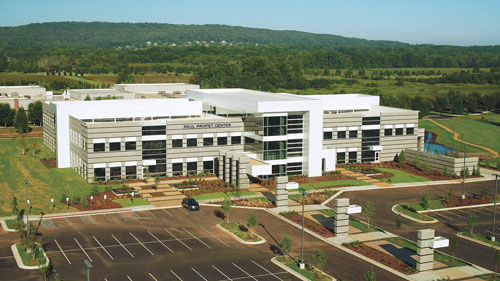While the world continues its fight against novel coronavirus, researchers and private industry have banded together in order to slow the spread of the virus and develop new ways of testing for and treating COVID-19. Now, more than ever, it’s evident that collaboration is necessary to overcome current challenges and nowhere is as uniquely qualified to help foster these collaborations than Huntsville’s HudsonAlpha Institute for Biotechnology.

In the past several weeks, companies on HudsonAlpha’s biotech campus have increased laboratory testing capacity, rolled out point-of-care testing diagnostics, continued work on antibody treatments for immune response, provided researchers with reagents for COVID-19 projects and researched personal protective equipment sterilization methods for the reuse of PPE equipment.
Diatherix-Eurofins, a diagnostic testing laboratory, released its COVID-19 panel on March 16 and immediately began testing patients with symptoms and at the direction of physicians. Since launching, Diatherix has increased its testing capacity by leveraging space at HudsonAlpha that was repurposed to fit Diatherix’s needs. Diatherix-Eurofins has now received Emergency Use Authorization (EUA) for its COVID-19 panel after running more than 60,000 tests nationwide.
“We appreciate that HudsonAlpha removed many obstacles that have allowed Diatherix to scale up capacity for large volumes of COVID-19 testing,” said Jen Cart, CEO of Diatherix Eurofins. “Their swift accommodation of our needs demonstrated the incredible support and true purpose of the HudsonAlpha’s mission for collaboration and connectivity.”
Much of this success can be attributed to the environment at HudsonAlpha, a growing biotechnology campus, that promotes connectivity, collaboration and creative thinking in challenging circumstances.
Locating on the HudsonAlpha campus offers life sciences companies of any stage or size access to the cutting edge of biotechnology and flexibility to grow. Since nonprofit HudsonAlpha has a mission to foster the success and growth of bioscience companies, it is neither an ordinary incubator nor landlord. More than 40 life sciences companies currently reside on campus, taking advantage of its collaborative culture and its proximity to on-site cutting-edge research and world class sequencing capabilities.
Fostering success of biotechs of all sizes and stages was the vision of co-founders Jim Hudson and the late Lonnie McMillian, and became a mission of the nonprofit institute, HudsonAlpha, more than 10 years ago. Their passion for helping innovative biotech entrepreneurs have the resources and support network necessary to get from “bench to bedside” continues on the growing biotech campus.
HUDSONALPHA CAMPUS
- 152 acres
- 470,000 SF in 3 buildings
- Turnkey and build to suit leases
- In Cummings Research Park, 2nd largest research park in the U.S.
- 3 buildings leasing, future buildings planning now
Collaboration and the flexibility to grow have proven key components of success at HudsonAlpha. Superior shared spaces and full services leases make locating at HudsonAlpha the first of many simple choices that allow biotech management teams to spend their time and effort on and in the business.
CEOs find that rather than spinning wheels coordinating adequate internet bandwidth, or finding impressive space for meetings with potential investors, they can spend time on solid pitch decks, effective business models and critical reimbursement considerations.
The Institute’s 152-acre biotech campus offers room to grow and access to quality resources, including top talent and a ready workforce, continuous knowledge sharing and funding sources for intellectual property—all in a collaborative community of bioscience enterprises.
“Incremental growth, allowing biotech companies to scale in place, is a primary benefit of the campus to an early stage biotech or a small to medium enterprise,” says Amy Sturdivant, director of business recruitment.
Life sciences companies can lease a single workstation, a single lab, a suite of offices or any combination of space within three buildings on campus. Unlike many incubators, HudsonAlpha does not require an equity stake in its resident Associate Companies and also does not aim to graduate them out in order to bring in new companies. Rather, the economic development team at HudsonAlpha works like a mini-chamber for its current tenants to bring them business programming and resources, networking events, and best of all, space to expand as companies need it.
Sites on the campus are available to bioscience companies seeking headquarters, space for advanced manufacturing and research and development (R&D) in an established genomics biotech cluster. Worldwide, many in big pharma, like Bayer and J&J, have established their own “farm-team” style incubators in order to continuously bring new ideas. HudsonAlpha offers the same innovative environment to biotech corporations seeking to benefit from new IP and discoveries.
More than 40 bioscience companies have chosen to establish a presence on the HudsonAlpha campus, taking advantage of proximity to this cutting edge research, and the state’s growing biotech workforce. To date, at least 10 companies at HudsonAlpha are working on COVID-19 related projects, including some companies working for others during this peak demand pandemic era.

